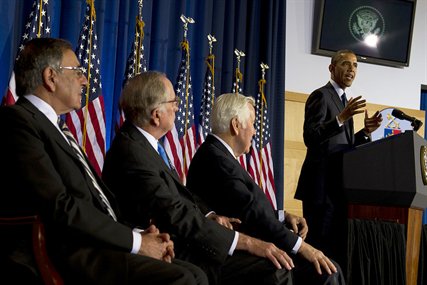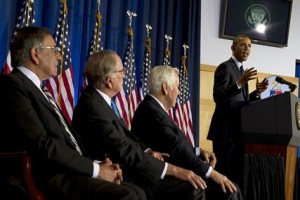
Urgent Nuclear Decisions for Obama’s Second Term
 After the elections, policymakers have the opportunity to move forward on nuclear nonproliferation issues that were held up by partisan rhetoric.
After the elections, policymakers have the opportunity to move forward on nuclear nonproliferation issues that were held up by partisan rhetoric.
A new report by the Center for Nonproliferation Studies outlines eight nuclear issues that require strong leadership from the administration.
“Critical Questions: Urgent Decisions for the Second Obama Administration” looks at U.S. policy on Iran, the Nuclear Posture Review Implementation Study, the Comprehensive Test Ban Treaty, the Nunn-Lugar Cooperative Threat Reduction Program, and other nuclear issues that have national security implications.
On Iran, Leonard Spector writes that the administration faces several key questions: whether to increase sanctions, whether and where to draw redlines, and how to make the military option credible.
In addition, Spector writes, the administration will have to consider alternatives to the current diplomatic path, such as bilateral negotiations with Iran.
The new presidential guidance for nuclear policy is another critical question. This guidance for nuclear force structure and targeting will come out of the follow-on study to the Nuclear Posture Review which lays out nuclear strategy in broad strokes.
The new nuclear guidance is an opportunity to reevaluate nuclear strategy, matching capabilities to current threats. As expensive programs to replace all three nuclear delivery systems are moving forward, presidential guidance on the nuclear force of the future is critical.
“These are “fifty year” decisions that will affect America’s deterrent and its position in the world for decades to come, and also the many policy and procurement decisions that will need to be made in the next four years,” writes Jon Wolfsthal.
Miles Pomper argues that the administration must also work to ratify the Comprehensive Nuclear Test Ban Treaty if they ever expect to get additional countries into the CTBT, like China, India and Pakistan.
The last vote on ratification was in 1992, and as Pomper states, many of the main objectives to US ratification have been resolved. He goes on to say that the administration will have the best chance at ratification in the coming year before the next set of midterm elections.
The CTBTO verification regime is robust and technologically savvy. With a two-thirds majority needed for ratification, the case needs to be made that ratification will clearly enhance US national security, not jeopardize it.
The Nunn-Lugar Cooperative Threat Reduction Program is another key nuclear security issue facing the administration. The program is set to expire in June 2013 and Russia has signaled its intent not to renew the program.
The CTR has been responsible for, among other things, deactivating over 7,500 nuclear warheads and destroying over 30 nuclear submarines. Because of this cooperation, writes Bryan Lee, the Russians feel that there are some serious security issues that need to be dealt with.
The report also points quickly to the upcoming end of several key bilateral nuclear cooperation agreements with states like China, South Korea and Taiwan. These and new agreements with states like Jordan, Saudi Arabia, Vietnam and Turkey need to be seriously assessed for their contribution towards non-proliferation policy.
These nuclear security challenges are critical national security issues for the U.S. Addressing these challenges will not be easy, but it can be done if policymakers move beyond partisan politics and take a strategic, nonpartisan approach.





